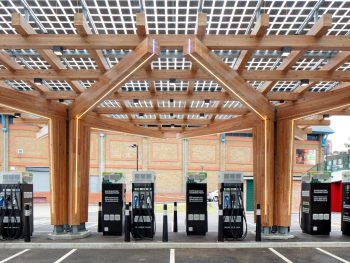London’s 2030 EV Infrastructure Strategy to ‘unlock’ public sector land for charge points
Mayor of London, Sadiq Khan has pledged to “unlock” land owned by the Greater London Authority Group and London boroughs to locate around 1,000 rapid charge points by 2030.

Public sector land could host a quarter of the rapids needed by 2030
While there are now around 7,600 publicly accessible charge points in London, up 55% between 2019 and 2021 and delivered through both the public and private sectors, new modelling from TfL estimates that by 2030 London could need 40,000-60,000 charge points, of which up to 4,000 will be rapid charge points.
And public sector land could accommodate around 1,000 of these rapid charge points, which will be key to supporting EV uptake, especially for drivers without off-street home charging, essential travel and for high-mileage users.
The key commitment was made as part of the publication of the draft summary of London’s 2030 EV Infrastructure Strategy, which is due to be revealed in full later this year. The document builds on the Mayor’s EV Infrastructure Taskforce published in 2019, which forecast how many charge points would be needed by 2025 and indicated that there would need to be a shift from public sector to private sector delivery.
Since then, the Government has announced the 2030 ICE ban and the new document updates forecasts for London’s charging needs up to 2025 and 2030, and sets out how the public and private sectors can further support the delivery of EV infrastructure in London.
Christina Calderato, director of transport strategy & policy for TfL, said: “Since we published the Mayor’s Taskforce EV Infrastructure Delivery Plan in 2019 the number of EV charge points in London has increased by 55%, and now accounts for approximately a third of all charge points in the UK. The innovative approach to unlocking public sector land in the capital, set out in the Mayor’s 2030 Electric Vehicle Infrastructure Strategy, will accelerate the delivery of much needed rapid charge points even further, supporting better access for all users in all areas of London.”
The draft summary adds that London’s boroughs will be encouraged to continue and enhance delivery of residential slow-to-fast charge points on their land, where users can access lower-cost energy even if they don’t have access to home charging.
The plan also says that government funding and support will be vital if London is to meet the demand for EV charging infrastructure and it calls for a national successor funding scheme, to support the roll out of on-street and rapid charge points, which would follow from the success of Go Ultra Low City Scheme (GULCS) and On-Street Residential Charge point Scheme (ORCS).
To support the needs of EV users, a bespoke application platform interface (API) will be developed to cover all charge points across London, starting in 2022.
And there are plans for a commercial fleet database that will gather data on what the charging needs for electric commercial vehicles are and the infrastructure needed, providing a blueprint. As such, TfL is seeking Government funding of up to £1m to develop a pilot database of commercial fleet activity and set the context for a scalable national version to be developed.
The plans were announced last Friday (15 October 2021) as Sadiq Khan visited LEVC’s factory in Coventry where it makes its range-extended TX taxi and VN5 vans, showing his commitment to working with regions. There are now more than 4,400 LEVC TX taxis on London’s roads.
During his trip to Coventry, the Mayor also visited the Ultra Low Emission Zone (ULEZ) control centre at Capita, prior to the expansion of the ULEZ on 25 October 2021.
The Mayor’s visit also coincided with his official submission to the Government’s Comprehensive Spending Review (CSR) with a warning to ministers that without further measures to support London’s economy it will hamper the entire UK’s recovery from Covid-19.
Sadiq Khan said: “Tackling the climate crisis and growing our economy across the UK is about regions working together and investing in new technologies. London is ready and willing to play its part in ensuring a strong and green national recovery from this terrible pandemic.”
The Mayor’s draft summary EV Infrastructure Strategy can be found here.

















